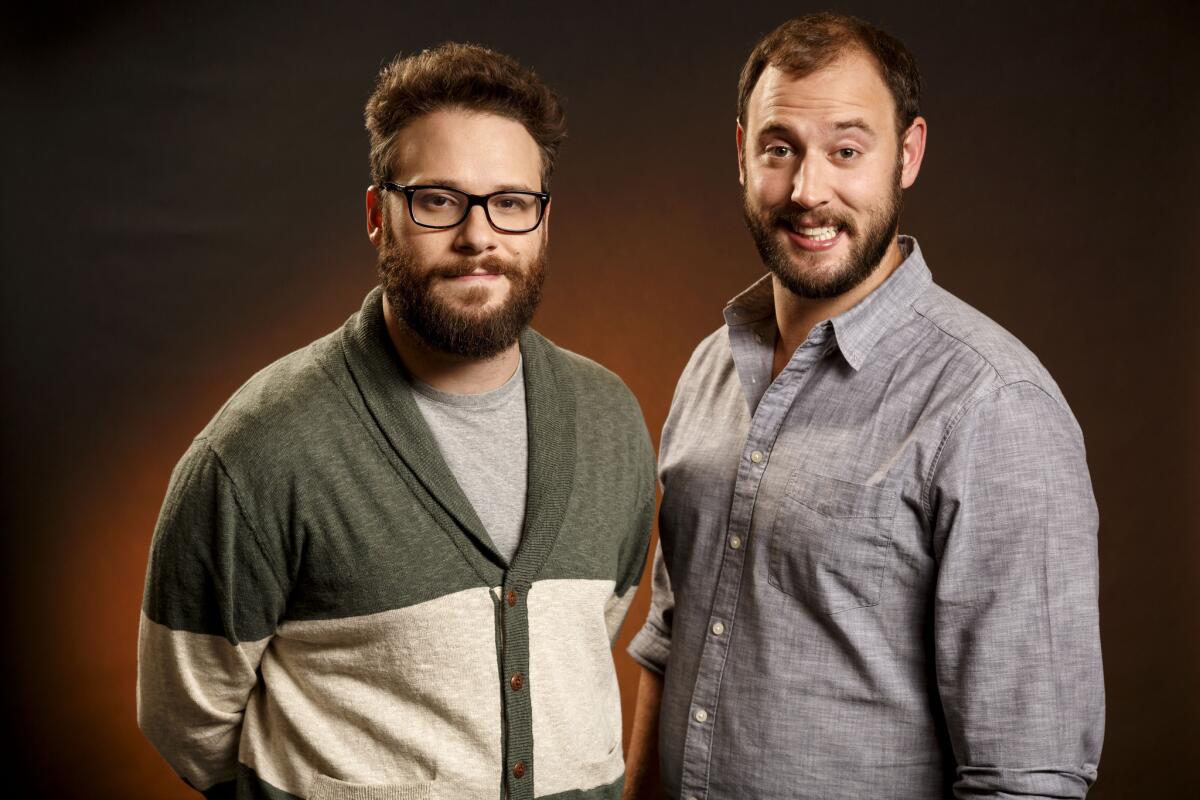Sony’s North Korea film ‘The Interview’: Can it achieve cult status?

Cult movies come about in different ways. Some, like “The Rocky Horror Picture Show,” happen because their particular brand of badness lends itself to celebration, the dialogue or characters ripening from cheese into camp.
Others, like “The Big Lebowski,” reach cult status through the perfect mix of style and fan base. “Lebowski’s” unique strangeness attracts a core following, and over time that following spread the holy word, creating fan fests and cultism.
The question of the cult movie has come up often in recent days with regard to “The Interview.” As the Seth Rogen-Evan Goldberg film about the fictional killing of Kim Jong Un was pulled by Sony from theaters over the last week, it has gone from midsize Christmas release to forbidden holiday fruit, and its status could well yet evolve further in the days ahead.
Let’s forget that the film is, for the moment, not scheduled for any kind of release, as Sony and other distribution parties remain worried about more attacks. This is a factor, but not a long term one -- it’s only a matter of time before the film sees the light of day one way or another. (Reports have already surfaced of a possible online release via Sony platform Crackle, as well as talk from independent theaters that they’d still be down for a release. There is also, of course, the chance for a release via an unofficial leak.)
The issue is what will happen when the film comes out -- and, specifically, whether it will become a cult hit when it does.
The case is unusual in several ways. For one thing, “The Interview” lacks the strangeness in content or style of many cult movies -- far from bizarre or campy, its jokes are largely of the mainstream studio variety. No dudes abide, no frugal ladies can be exhorted to buy umbrellas.
What the film does have is an exotic setting. It’s rare that any mainstream product deals so irreverently with something as serious as the oppression of people. There may be a lot of rectum jokes and standard-issue bits about celebrity culture, but they take place amid the food shortages, propaganda and megalomania of Kim Jong Un’s North Korea.
That exotic setting in turn is what makes it forbidden -- or rather, has made it forbidden by North Korea and being de facto banned in the United States. And that’s where the novelty really lies. Pretty much any movie someone tells us we can’t see is going to become more interesting. But a movie in this hyper-marketed Hollywood world that simultaneously can’t be seen? That creates the most improbable of situations.
It was particularly strange that, on the day last week that Sony said it was pulling the release of “The Interview,” ads were still running for it in late-night television. The contrast laid bare exactly how unusual this had all become -- a movie that was as part of the Hollywood machine as any, had been talked about more than nearly all other films, and yet seemed at the same time to be disappearing before our eyes.
But that’s also what makes this, ultimately, while a huge curiosity, perhaps also not a cult movie.
Almost all cult movies have one factor in common -- they gain their status slowly, via discovery across generations. “The Interview” is built for the opposite. When it comes out, it will be consumed, judged and commentated upon quickly. If the modern media world’s snap-judgment wouldn’t do that, the huge number of people made curious by the pronouncements of a U.S. president will. Cult films tend to be seen by small groups of people over long periods of time. “The Interview” will, in the not too distant future, be seen by large groups over short periods of time.
Of all the potentially comparable movies out there, the fate Sony almost wants to avoid is “The Day the Clown Died.” Jerry Lewis’ infamous dark comedy about the Holocaust from 1972 has never seen the light of day and almost certainly never will. Lewis himself has said he is embarrassed by the film and has marshaled his legal rights to ensure it never is released, despite fans repeatedly asking him about it 40 years later.
Part of why the film has remained such a subject of intrigue is precisely because so few have seen it. Its cultishness is predicated on the idea that it is not available. If that were ever to change, a lot of the intrigue and novelty would go out the window and its reception would help it become whatever it would have been without all the hype (and, in fact, because of all the heightened expectations, perhaps even less than that).
A similar thing could happen with “The interview. “ No matter how much it’s liked -- and there are a number of funny set pieces between Rogen and co-star James Franco -- the novelty goes away the second the film hits the Internet, cable operators or theaters. And that’s why the movie will ultimately probably avoid cult status. It’s the banned-movie paradox: In order to reach maximum interest, it has to achieve minimal viewing.
It has been interesting to follow “The Interview” saga as it has unfolded and see who has raised their hands to weigh in. Over the weekend, the head of the Republican National Committee has even encouraged theaters to show it and said he will personally make an appeal to millions of members to go see it. When the president and a top GOP leader are urging the same thing, you know you’ve created something strange. Perhaps even stranger than a cult movie.
Twitter: @ZeitchikLAT
More to Read
Only good movies
Get the Indie Focus newsletter, Mark Olsen's weekly guide to the world of cinema.
You may occasionally receive promotional content from the Los Angeles Times.











